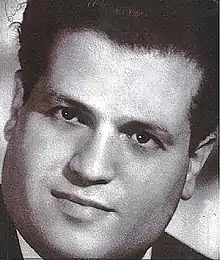Ali Boumendjel
Ali Boumendjel (May 24, 1919 – March 23, 1957) was an Algerian revolutionary and lawyer. [1]
Biography

Born in Relizane to an educated family from Beni Yeni region, Boumendjel was educated at the Duveyrier college in Blida, where he met with other future figures of the Algerian revolution, such as Abane Ramdane, Benyoucef Benkhedda and Saad Dahlab. He then oriented his career toward law, and became a journalist for the Egalité journal, controlled by the integrationists of Ferhat Abbas. During the revolution he became, with Jacques Verges, one of many lawyers working for the Algerian nationalists. In 1955, he joined the National Liberation Front (FLN) with his old friend Abane Ramdane, after Ramdane was released from prison.[2] Ramdane advised Boumendjel to change his professional orientation, so he joined the litigation department of Shell corporation, while still continuing his militantism in the FLN.
Ali studied law and became a lawyer. His political awakening took place during the days of the Popular Front. It was marked by the call for the emancipation of the Algerian Nation launched by Messali Hadj and sensitive to the commitment and communist mobilization in the Muslim Congress. He refused military service in the French Army, which earned him a list of anti-French activities and to be considered a dangerous nationalist.
Boumendjel was arrested on February 9, 1957, and underwent over a month of torture at the hands of commandant Paul Aussaresses and his men. On March 23, in El Biar, outside Algiers, he was thrown from the sixth floor of a building; his death was passed off as a suicide.[3] Forty-three years later, in 2000, Aussaresses admitted that Boumendjel had been murdered.[4]

Following the recommendations of the report by historian Benjamin Stora on remembrance of French Algeria, on March 2, 2021, French President Emmanuel Macron recognized that Ali Boumendjel was "tortured and murdered" by the French army. [5] The president received four of Ali Boumendjel's grandchildren to announce to them the recognition, on behalf of France, of his assassination.[6] The press release evokes the confession of Paul Aussaresses to have ordered one of his subordinates to disguise the murder as suicide. [7]
Tributes
A street and a metro station bear his name in Algiers as well as a city in Relizane, his birthplace.
References
- ALI BOUMENDJEL
- "Autopsie d'un engagement. Biographie Ali Boumendjel, l'avocat martyr" (in French). Dja Zairess. November 20, 2010.
- Benyahia, Aek (February 19, 2012). "Ali Boumendjel, avocat pacifiste, torturé et assassiné par les paras de Massu" (in French). Reflexion.
- "L'accablante confession du général Aussaresses sur la torture en Algérie". Le Monde (in French). 3 May 2001. (subscription required)
- Guerre d'Algérie : Emmanuel Macron reconnaît que le militant Ali Boumendjel a été «torturé et assassiné» par l'armée française
- "Ali Boumendjel: France admits 'torture and murder' of Algerian nationalist". BBC News. 2021-03-03. Retrieved 2021-03-03.
- Reconnaissance par la France de l’assassinat d’Ali Boumendjel.
Bibliography
- Malika Rahal (2010). Ali Boumendjel, une affaire française, une histoire algérienne. Paris: Les Belles Lettres. ISBN 978-2251900056.